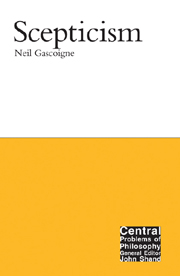1 - Scepticism and knowledge
Summary
Introduction
The aim of this chapter is to provide a preliminary introduction to the problem of scepticism as a contemporary epistemologist would see it; namely, as a problem that emerges when one adopts the theoretical attitude towards knowledge claims. In pursuit of this aim, the chapter has three main objectives: first, to enquire into what it is that the sceptic doubts and therefore discover to what aspect of our human self-understanding that doubt poses a threat; secondly, to examine two ways in which the sceptic goes about generating her doubt, the so-called ‘argument from ignorance’ and the ‘Agrippan argument’; and finally, to provide a context from within which the threat of sceptical doubt and the ways in which it is generated can be seen to relate to the concerns of the contemporary epistemologist. In the fulfilment of these objectives I intend to motivate my claim that to understand sceptical doubt more fully we need to know something of its historical development.
The task of epistemology
The central task of epistemology as many philosophers see it is summed up by the American philosopher Barry Stroud:
We aspire in philosophy to see ourselves as knowing all or most of the things we think we know and to understand how all that knowledge is possible. We want an explanation, not just of this or that item or piece of knowledge, but of knowledge, or knowledge of a certain kind, in general.
(1994: 296)- Type
- Chapter
- Information
- Scepticism , pp. 6 - 30Publisher: Acumen PublishingPrint publication year: 2002



